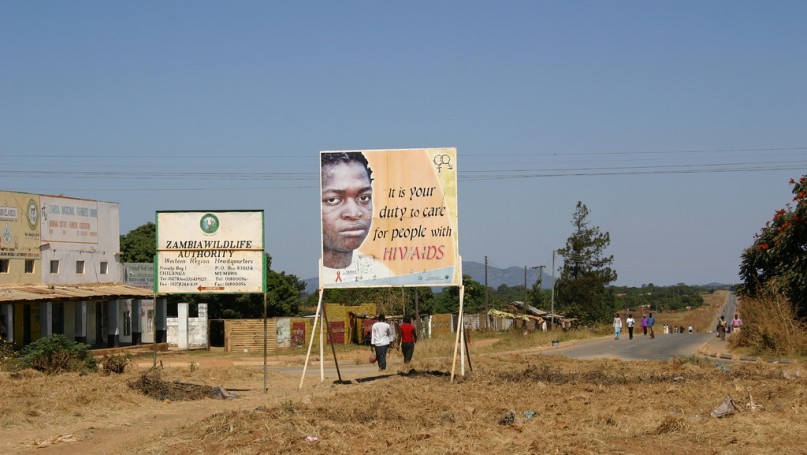
Zambia is getting to grips with its AIDS crisis thanks to the millions of dollars in donor aid allowing the country to make anti-retroviral treatment universally available. But these precious drugs can often stay in hospitals and clinics while most of the population is scattered across a vast landscape without the means to get around.
That is where Mary came in. Her role is “to walk the last mile”. She is a Red Cross volunteer from a remote rural district north of Kabwe. I drove to see her some 4 hours out of Lusaka.
A tall motherly woman in her 40s, Mary looked after a dozen people with HIV, visiting each of them once a week to offer their weekly supply of medication and cajoling them to take it. The patients had no transport and were either too sick or too dejected to go to the distant government health clinic. In any case, there was a black market in HIV drugs and desperately poor patients often sold their stock to get other essentials. So it was better to supply them in small quantities and supervise their consumption. This part of Zambia is hilly and bushy and Mary trudged some 30 miles each week to get around her caseload. And she could not be late or have a lie-in if she felt too tired one morning. Her patients’ lives depended on her turning up with their life-saving medication.
I went with Mary. A two-mile walk brought us to an HIV positive teenage orphan who was caring for her baby sister after their parents had both died of AIDS. Mary handed over the medicine and watched her take it while the baby crawled around the bare shack. After being assured that there was enough milk powder for the baby and repairs had been planned to the roof before the rains came, we walked a further two miles to her second patient.
This was a farmer who had just been diagnosed HIV positive. His wife and five children sat in a morose circle while he ranted deliriously about his corn harvest which had to be brought in or they would all starve. Mary cooled his feverish brow and thrust the life-saving pills down his throat while discussing with his wife if they had nearby relatives to help with the harvest.
To get to our next patient required a rough uphill scramble. She was an older woman living on her own who had refused testing for HIV and was now almost certainly dying from AIDS. Mary cooked her some porridge and gave her paracetamol for her headache.
Our afternoon’s work done, Mary set a brisk pace back to the base clinic. She had to get back to also look after her own family. As I clambered gratefully back into the Landcruiser, I said, “thank you so much Mary for showing me around. My admiration for all your good work”. I meant it. I had learnt so much but, shamefully, my mind was already on a cold beer back in Lusaka after the long and dusty day. My legs ached from the unaccustomed walking through the Zambian bush. Somewhat ritually, I added, “is there anything I can do for you?”
“Thanks for coming so far”, Mary responded. “We are so proud that such a big man from Geneva should bother with us. No, we don’t need anything”. And then she hesitated.
“Yes…?” I asked, a little warily, concerned about what she may demand. My department had such a tiny budget and everywhere I went there were expectations that I could not meet.
“There is one small thing, Sir”, said Mary. “Do you think that the Red Cross could give us umbrellas? Our head boils under the sun and when it rains we are drenched.” In a barely audible voice, she finished, “then we get sick ourselves”.
I was stunned. “Is that all…”, I muttered sheepishly, lowering my eyes to her torn bare feet. “Yes, of course, you can have an umbrella and also flip-flops or shoes, as you prefer”. I turned to the secretary general of the Zambia Red Cross for confirmation that we would put such a scheme into immediate effect.
As I was driven away, I felt humbled. Mary had given the big man from Geneva an enduring insight. I would never forget that my well-paid job was built on the back of countless volunteers like Mary. Everyday, in very corner of the world, there are people like her, unpaid and unrecognised, going about their labour of love, bringing comfort and hope to neighbours in distress. This then is the spirit of true voluntarism, the impulse to help others without expectation of a return benefit.
Zambia is overcoming the burden of HIV thanks to dedicated volunteers like Mary. In a very real sense, she is also saving her country and the world, one life at a time.
Further Reading on E-International Relations
- Decolonising Development: Putting Life at the Centre
- How Far Has Bangladesh Come One Year After Its “Second Independence”?
- ‘No More Morias’: How the World’s Worst Refugee Camp Was Destined to Fail
- Opinion – How Could COP30 Put Climate Back at the Top of the Global Agenda?
- Rebranding China’s Global Role: Xi Jinping at the World Economic Forum
- Opinion – How Global Politics Exploits Women’s Health